

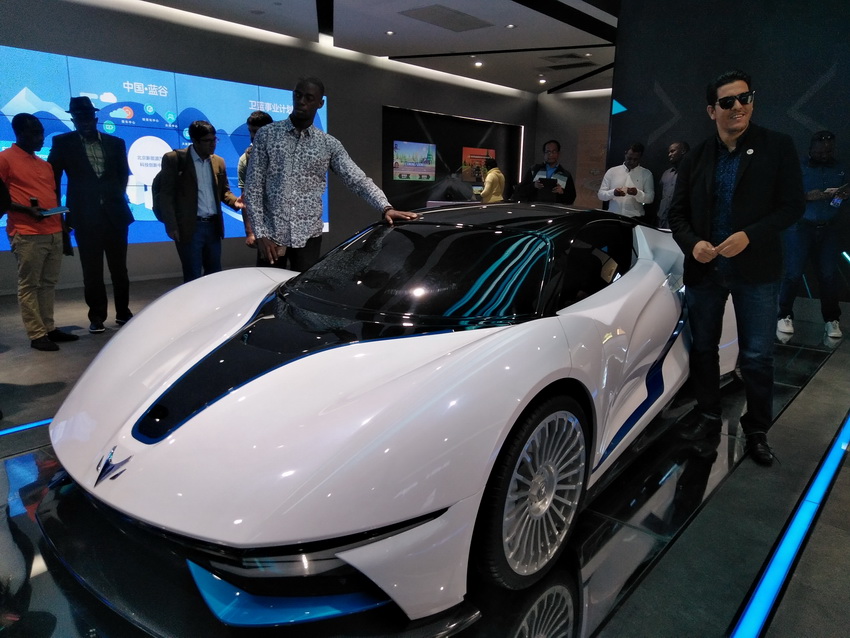
Journalists admire one of BAIC BJEV's electric car models. Photo by Kimeng Hilton
The Beijing Automotive Industry Corporation-Beijing Electric Vehicle Company, BAIC BJEV is one of China’s major manufacturers of New Energy Vehicles, NEVS or electric vehicles. Some 42 African, South East Asian and South Asian journalists recently visited the company’s BluePark headquarters on the outskirts of the Chinese capital, Beijing. The visit was organised by the Beijing Broadcasting Corporation.
BAIC Motors was founded in 2009.
With joint State/private ownership, the company looks forward to listing on the stock exchange. BAIC Executive Vice President, Li Xingxing, briefed the visiting journalists on the company’s activities, saying NEV vehicles are the path to take because they do not pollute the environment. BAIC BJEV plans to expand its business to more countries, Li Xingxing said. It has already set up a plant in South Africa and does business in 48 countries, including Sudan, Ghana, Egypt, Angola and Ethiopia.
South African plant
It has invested about 2 billion RMB in the 48 countries, creating 6,000 direct jobs and about 30,000 indirect jobs. The first vehicles from the 826 million US dollar South African assembly plant are due early next year, with most of them destined for export to the rest of Africa. The factory, near the car export hub of Port Elizabeth, will be the first new car plant in South Africa in four decades. It is expected to build 50,000 vehicles a year by 2022, half its estimated peak output.
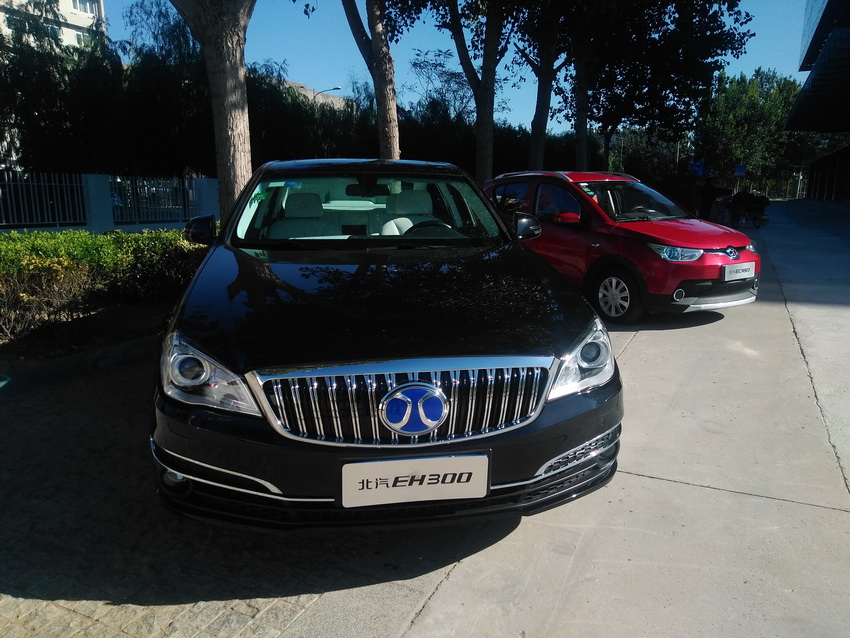
BAIC BJEV's target is to attain 100 billion RMB in sales and 60 billion RMB in annual revenue. Photo by Kimeng Hilton
BAIC owns a 65 per cent stake in the joint venture, with South Africa’s State-owned Industrial Development Corporation, owning the rest. The company assures of the availability of after-service spare parts in Africa. Malawi will soon be Africa’s spare parts centre, Li Xingxing disclosed.
Leading sales in China
BAIC BJEV has in the past four years been the leading electric car seller in China and the fourth globally. It recently sold 100,000 cars, equivalent to 250,000 tonnes of carbon emission reduction or 2 million trees needed to curb green house gas emissions. The company looks forward to exceed its production capacity of 800,000 cars a year. It has five series of products, with some cars going 400 km per charge. The target is to attain 100 billion RMB in sales and 60 billion RMB in annual revenue, officials explained.
Advantages of energy cars
The advantages of new energy vehicles include social responsibility of not polluting the environment, their cost-effectiveness and low maintenance cost, and the core technologies they contain. African journalists who were driven around in different models of BAIC’s cars said they were noiseless as well as being pollution-free. Meanwhile, BAIC has more than 2,000 patents.
Electrek, a NEV industry publication recently reported that China in 2016 doubled its fleet of electric cars to over 600,000, more than the US and all of Europe combined. China's NEV market has over 60 models, 13 of which sold over 10,000 units in 2016, said Electrek's Fred Lambert.
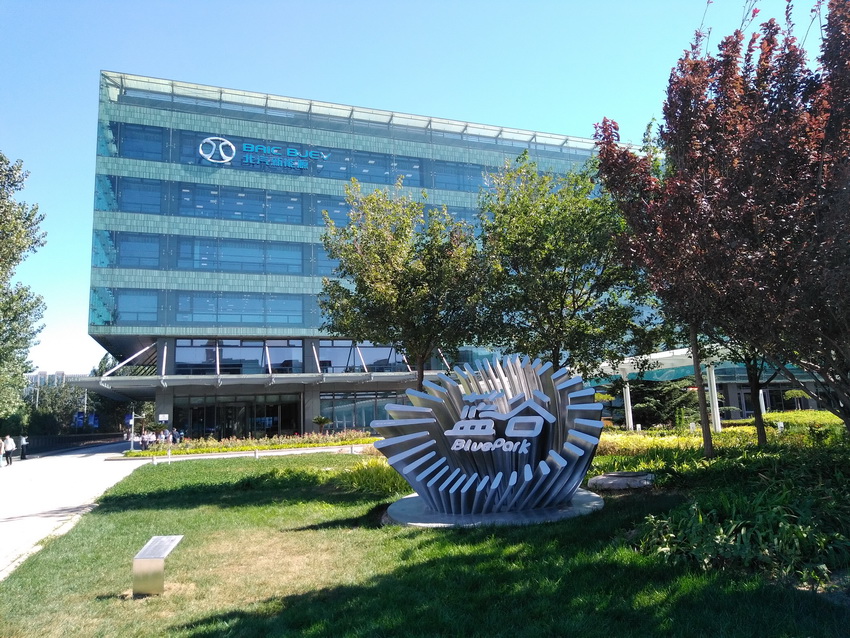
The dividends of BAIC BJEV's investments in 48 countries include the creation of 6,000 direct jobs and about 30,000 indirect jobs. Photo by Kimeng Hilton
State support
Generous government subsidies - up to 100,000 RMB (15,000 US dollars) for plug-in hybrid and all-electric cars - have undoubtedly helped to drive the market. With the Chinese government poised to allow foreign NEV companies to manufacture in China without being part of joint ventures, the competition is expected to become stiffer.
Leader in NEV development
Meanwhile, China now leads the world in New Energy Vehicle development, said a survey released last July for the second quarter of 2017. Results of the E-Mobility Index survey were jointly released by German consultancy firm, Roland Berger and automobile study institute, Forschungsgesellschaft Kraftfahrwesen Aachen.
China's new energy auto industry from 2009 experienced robust expansion, becoming the world's largest market since 2015, said a recent statement from the Chinese Ministry of Industry and Information Technology, MIIT. The German consultancy's report predicted that China will play a leading role in the future development of the global NEV industry, thanks to its strong market growth.
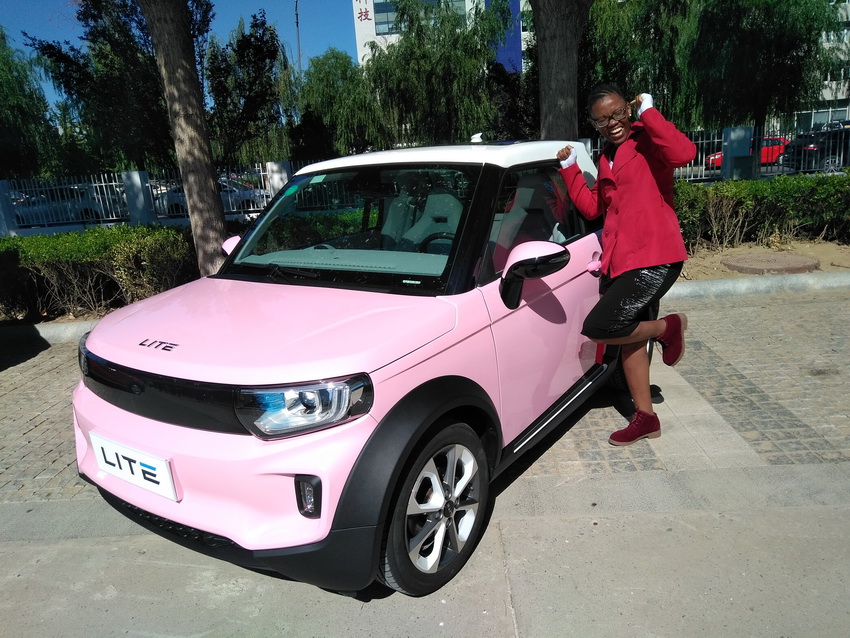
Journalist Queen Mokwapae prepares to take a ride in one of BAIC BJEV's electric cars. Photo by Kimeng Hilton
Individual efforts
Besides government support and market demand, efforts by auto makers also prompted the domestic industry's trend, the survey said. BAIC recorded year-on-year NEV sales of 159 per cent in 2016 and 99 per cent in the first half of 2017. Chinese auto companies including BYD, BAIC and Geely, ranked among the top brands worldwide in terms of electric car sales in 2016, the China Passenger Car Association said.
Growing patronage
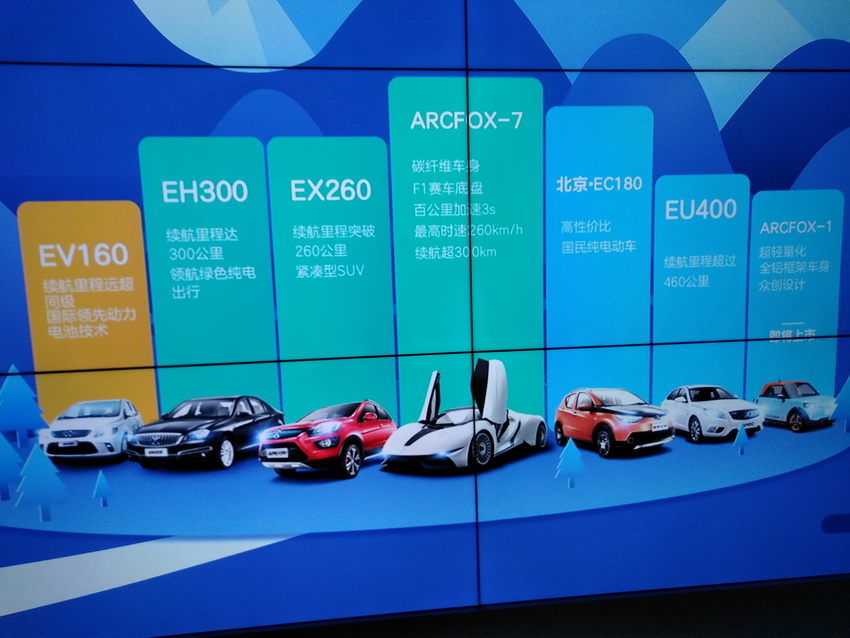
The new plant in South Africa is expected to build 50,000 vehicles a year by 2022. Photo by Kimeng Hilton
Sales of electric cars in China rose from less than 5,000 in 2011 to about 510,000 in 2016. Production and sales were particularly robust last June with 59,000 units sold and 65,000 units produced, up 33 per cent and 43.4 per cent respectively from a year earlier. The China Association of Automobile Manufacturers estimates that domestic NEV sales could hit 800,000 units at the end of this year, attributing the success to government support and simpler licensing procedures.
“The output, sales and ownership of NEVs in China accounted for more than half of global levels last year,” said Chinese Vice Premier Ma Kai at a meeting in early July. He urged more research on batteries, charging technology and the construction of charging facilities.
*Kimeng Hilton Ndukong, a contributor to People’s Daily Online, is Sub-Editor for World News with Cameroon Tribune bilingual daily newspaper in Cameroon. He is currently a 2017 China-Africa Press Centre, CAPC fellow.

 Award-winning photos show poverty reduction achievements in NE China's Jilin province
Award-winning photos show poverty reduction achievements in NE China's Jilin province People dance to greet advent of New Year in Ameiqituo Town, Guizhou
People dance to greet advent of New Year in Ameiqituo Town, Guizhou Fire brigade in Shanghai holds group wedding
Fire brigade in Shanghai holds group wedding Tourists enjoy ice sculptures in Datan Town, north China
Tourists enjoy ice sculptures in Datan Town, north China Sunset scenery of Dayan Pagoda in Xi'an
Sunset scenery of Dayan Pagoda in Xi'an Tourists have fun at scenic spot in Nanlong Town, NW China
Tourists have fun at scenic spot in Nanlong Town, NW China Harbin attracts tourists by making best use of ice in winter
Harbin attracts tourists by making best use of ice in winter In pics: FIS Alpine Ski Women's World Cup Slalom
In pics: FIS Alpine Ski Women's World Cup Slalom Black-necked cranes rest at reservoir in Lhunzhub County, Lhasa
Black-necked cranes rest at reservoir in Lhunzhub County, Lhasa China's FAST telescope will be available to foreign scientists in April
China's FAST telescope will be available to foreign scientists in April